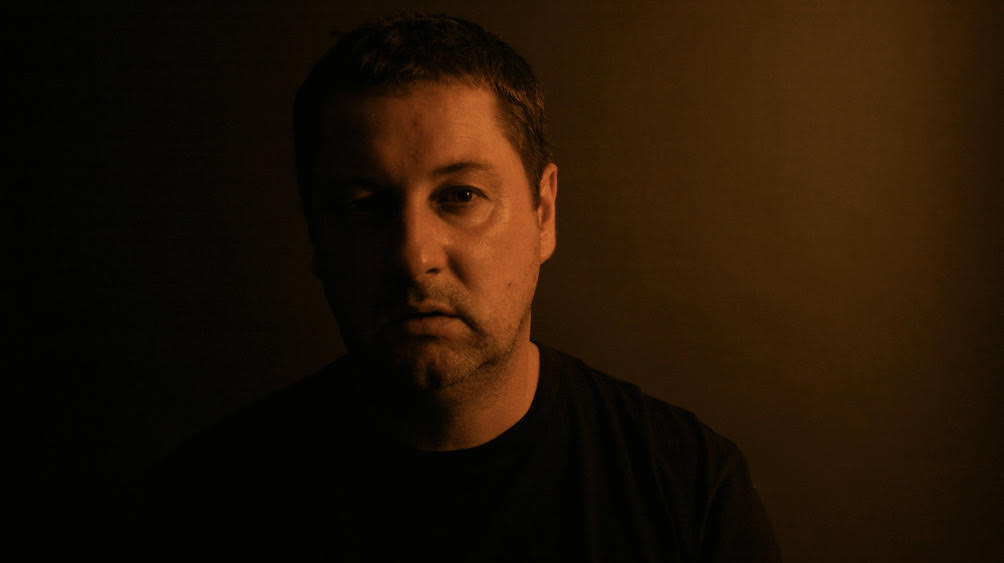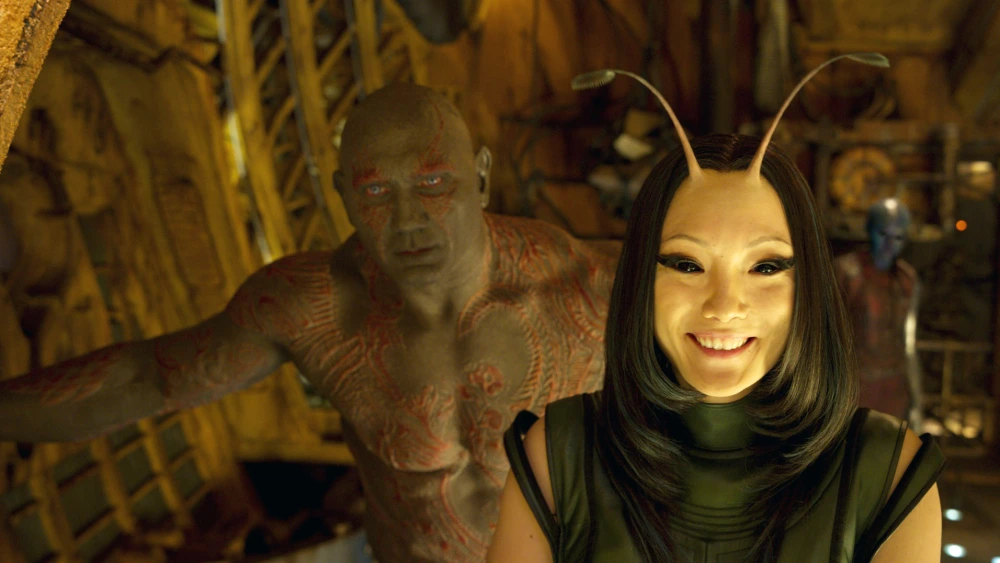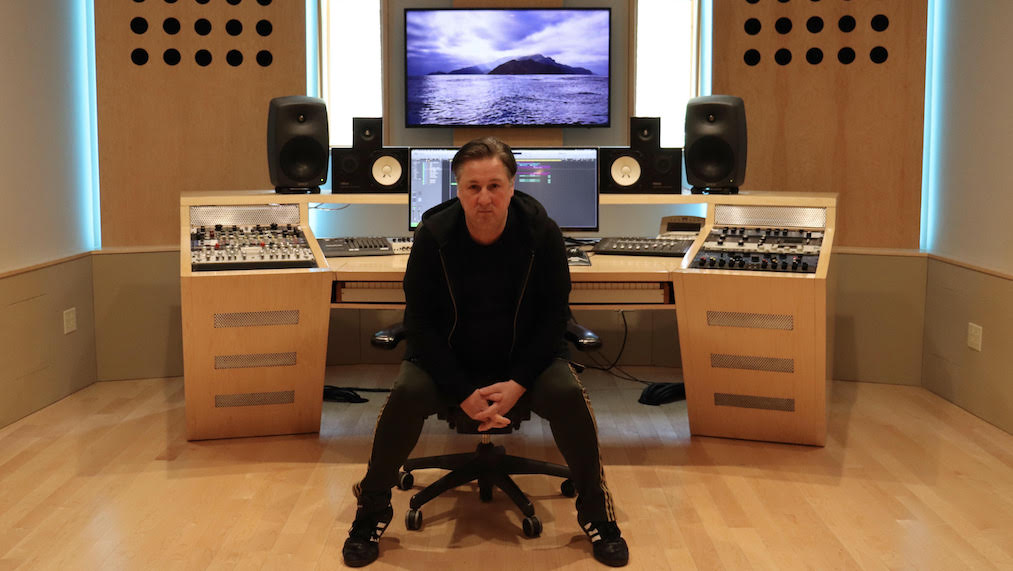
Now, calling John Murphy‘s time away from composing a disappearance is perhaps a bit much. However, over the seven years or so the 28 Days Later and Sunshine composer was taking a break, his absence in cinemas was felt. In the late ’90s and early 2000s, Murphy composed absolute blasts of scores, including Snatch and Lock, Stock and Two Smoking Barrels.
After scoring Kick-Ass, Murphy stepped away from film. We’ll let him explain why, but if there’s someone in part to thank for his major return, it’s filmmaker James Gunn. Gunn brought Murphy back for his first high-profile studio gig in years with The Suicide Squad, and since then, the two have been inseparable collaborators and just reunited for Guardians of the Galaxy Vol. 3.
The third installment is darker and sillier than the previous installments, and as a result, Murphy wanted to reflect those creative choices with his cosmic score. Recently, Murphy explained to us his approach for Guardians of the Galaxy Vol. 3 and why he wisely stepped away from film composing at a high point in his career.
BTL: What were some stressful scenes to score in Guardians of the Galaxy Vol. 3?
Murphy: Working with James, it’s like working on an indie film, but on a massive epic scale. He has that sensibility and a bit of a rebel about him. So, there’s no stress in the creative process, it’s more about the responsibility and the expectation of the third installment of the trilogy. Once you get going, the nerves disappear and you just get into what you’re doing. But yeah, sometimes you look at the next scene and it doesn’t come straight away; you have to figure stuff out.
Not everything is obvious, especially with James. He likes to do things differently, and we knew this wouldn’t be a typical Marvel score. We decided early on to make the score as unique as we could, while still delivering those big epic moments when needed. So, the pressure was to bring our best and do it uniquely. Sometimes it took a few attempts to get it right. But overall, I love these movies and love working with James, and if I spent my time stressing about them, I’d ruin the whole experience.
BTL: With The Suicide Squad, it was a bit of a clean slate. Here, you’re following up composer Tyler Bates. Were there any themes from the other two movies that you wanted to pay off?
Murphy: We talked about this and we understood that we had to pay some respect to the themes from the first two movies. I loved the first two “Guardians” scores, and Tyler’s a friend of mine, so it was a responsibility to honor and arrange those themes as best as I could. But this third movie was quite different, darker in tone, and we knew the score had to reflect that. We chose the moments where we thought the original themes would fit best and used them there. We didn’t just jam them all over the score because that wouldn’t have been right.
I think we found the right balance and made it our own while paying homage. We knew there would be moments when we’d want to hear [Tyler’s] theme, so we found a few moments where we thought, “Yeah, this would be a great time to bring in that theme.” When you hear them in the film, I think they work well. We didn’t overuse it, and we made it our score.

BTL: It’s good to see James Gunn going back to his roots a bit with some of the horror involved in the animal [testing] sequences. Did you want to strike notes of horror now and then?
Murphy: Yeah, for sure. I mean, because what is horror? It’s our deepest fears. Horror is based on real humanity and real emotions. It’s all based on our deepest fears or our secret fears. So, it’s a very real thing to deal with musically. I love doing that, as long as it’s not cheesy and it serves a purpose. There’s good horror and bad horror, just like there’s good and bad everything.
If the director’s intent is genuine and not just trying to scare you for no reason, if the intent is to explore why these things might scare us or make us uncomfortable, then that’s interesting. But I wouldn’t do a horror film where people just wanted to scare the hell out of you for the sake of it. There’s nothing to work within that. But when James does touch on it a bit, it’s organic. It’s not for shock value. It’s to gently ease you into another place in the story. I do enjoy that stuff.
BTL: For The Suicide Squad, you had to strike that balance of giving the audience what they want out of a superhero movie score but also do something new. What’d you learn from that experience that you applied to Guardians?
Murphy: Well, it depends on how you approach it. It’s somewhat challenging. There was a big epiphany after 28 Days Later, because up until that point, I was half heartedly trying to do my own thing with the Guy Ritchie films like Lock, Stock, [and Two Smoking Barrels] and Snatch. But I wasn’t really brave enough; I didn’t have the confidence to fully commit to it. But when I got the chance 28 Days Later, I approached it in a completely different way. I thought, “Well, it’s either make it or break it here. Either people will get this or they won’t.” It was a different way to score within that genre. That was the moment when things changed for me.
BTL: What changed exactly?
I thought, “Why didn’t I just try to do my own thing from the beginning? Okay, this is the type of scene, but what else could be done musically?” That mindset is ingrained in me now. No matter what the film is, I will always think, “Here is a chase scene. People might expect this, but what else could be done here?”
With Guardians, yeah, we all love that big, epic Marvel sound. But it was never my intention or James’s intention to immediately jump into that and replicate that sound. From the beginning, we wanted to try different things and see what worked and what didn’t.
Thankfully, it ended up being quite a unique score within the genre. I hope we didn’t disappoint people with some of the moments, but when the time came, I believe we delivered what they wanted. It was fun to incorporate the Marvel sounds at times, especially in the big action scenes. We both thought, “Oh, screw it, let’s just go for it and embrace that.”

BTL: You recorded at Abbey Road, right?
Murphy: I was fortunate to work with the best choirs in London. We recorded at Abbey Road, which is a magical place. There’s something special about the natural sound you get there. I’ve recorded in many top studios around the world, but Abbey Road has its unique charm.
BTL: Which studio did you record in there?
Studio Two is where the Beatles recorded, so that’s a famous studio with a lot of history. But the big room, Studio One, is where we recorded. The Beatles did use it for “A Day in the Life” because they needed a full orchestra. When you walk into Studio Two, you realize that the greatest band that ever lived worked there. It’s not even that big of a studio, and the control room is quite small, so they must have been packed in there while working on Sgt. Pepper and other albums. It’s sacred ground.
BTL: There’s some great choir work in the film. What did you want out of the vocal arrangements?
I was fortunate to work with the best choirs in London. Regarding the vocal arrangements, I learned a lot throughout this process. I had to think about how to best arrange the chorals, even though I had experience with it before. The scale of this movie’s score required careful consideration because it was epic stuff.
BTL: What did learn about writing choral music?
Murphy: When it comes to choral music, it’s typically divided into four sections: bass, tenor, alto, and soprano. In the past, I used to think very simply, with the men singing the bass and tenor parts and the women singing the alto and soprano parts, almost like Lego blocks.
During this project, I started experimenting with mixing up the sections. I would have a big choral section in a piece of music and break it down, starting with everyone and then gradually adding or subtracting voices in different sections. For example, the tenors might sing the alto part at a certain point. I began to play around with the timing and combination of different groups, exploring how it affected the sound.
I also discovered the beauty of using a smaller number of voices within a section. Instead of having all the sopranos sing together, I realized how lovely it sounded when only three sopranos were singing instead of eight. It created a distinct and different sound. I started experimenting with when each group would sing, finding different combinations and articulations.
We even invented new sounds on the stage by exploring different mouth shapes and techniques. I hadn’t had much opportunity to work extensively with a choir in this way before, so it was a great learning experience, especially with the incredible choir I had the privilege to work with.

BTL: As for the needle drops, those songs have a way of bringing you back to a specific time and place. Did you have that experience hearing them?
Murphy:[The Flaming Lips’] “Do You Realize??”, I remember being in Liverpool and hearing that for the first time and thinking it had the most beautiful lyrics I’d heard for a long, long time. You know, just raw and truthful. Of course, I remember hearing [Radiohead’s] “Creep” for the first time, and that just blew me away. I’d never heard a sound like that, you know? Again, that was back in Liverpool. And again, that was in a club. I spent most of my time in clubs in Liverpool, so most of the music I heard for the first time would’ve been drunk in a club somewhere in Liverpool [laughs].
BTL: [Laughs] Was composing ever an ambition during that time when you were drunk and playing music in the clubs?
Murphy: No, ’cause I was a musician, you know, I was in bands in Liverpool. And then I became a session musician when I was about 15 or 16. At that time in Liverpool, everyone seemed to be making records and stuff, so I got to play on some of these records. And then when I got to about 17, I got the chance to tour with some of these bands. I toured for five or six years, and that was amazing, getting to play in Japan and all over Europe.
But that’s when I started writing songs with some of these bands. I ended up through luck meeting somebody and I got a chance to write some songs for this little tiny movie [called Leon the Pig Farmer]. And then when they couldn’t afford a real composer, we were asked if we could write a score. I was writing with David Hughes then, who was one of my best friends. We just lied and said, “Oh yeah, we could do a score.” [Laughs] I was 25 or something, and you know, what are you gonna say if someone says, “Can you write a score as well?” It was for a tiny indie nobody was making money off.
We got asked, “Can you do it for if we give you $2,000?” We were like, “Wow, $2,000.” If that film would’ve had a budget of more than $2,000, I probably would never have become a film composer. The movie came out and the movie did well, won awards in Europe, Venice Film Festival, and the director went on to do another film because they were all first-time director, first-time producer, first-time writer. All three of those guys went on to do their films. And of course, they had only ever worked with me and Dave, so they said, “Will you do our next movie?”
BTL: As accidental film composers, how’d you learn and study when you start getting the gigs?
Yeah, there were no five years of Berkeley or anything. We stumbled into it and learned as we went along. That was the jam. We just worked our asses off, tried hard, and I did as much studying as I could in my way, just by watching all the movies that I loved and trying to figure out what the music was doing. ‘Cause I thought, shit, I’m gonna be a film composer, so I’m gonna need to know what it is.
I made a list of all my favorite movies, and then I just watched every one of them on VHS,. King Kong music comes in here, you know, and oh wow, that’s a theme, James Bond, you know? I just went through all my favorite movies, and that was my Berkeley, that was my Juilliard.

BTL: You took a long break as a film composer. How are you feeling these days as a musician?
Murphy: I mean, so much better. I disappeared for eight years or something. It wasn’t meant to be that long, you know. The kids were young. I was feeling just spent. I was doing two or three movies at the same time. I decided even before I did Kick-Ass that I was gonna take a break for a couple of years and just be with the kids because I was missing out on everything. We’d plan holidays and I wouldn’t be able to go because the film would go on for another month. I just thought, “What’s the point of all of this? If all that matters to me is my family, what is the point of this bullshit?”
I knew I had to take some time off and be with my family. When I realized the effect it had on them, of me being there and them having a dad, suddenly it broke my heart. I just thought, “What have I done? I missed them being one, two, and three. I have to fix this.” I took a bit more time off, and it was the best time of my life.
BTL: That’s fantastic.
Murphy: I got to set up my record label, release some stuff, watched a lot of soccer, read lots of books like I used to, and just became a human being again. And then suddenly six years had passed, and I wasn’t missing movies, but I thought I better get back to work soon. I thought, “Okay, the kids are older. Now I can go back in.”
BTL: Were you nervous going back at all?
Murphy: I was nervous, to be honest. I thought I haven’t done this for seven years, so I need to ease my way back in. I thought I’ll do a little bit of TV first. And then [BBC One’s] Les Mis came in, and I love Victor Hugo. It was an eight-episode series, so I thought, perfect. I’ll do Les Mis, it’ll blow the cobwebs away, and then I’ll do a really small indie film. That was the plan.
I finished Les Mis, I was just about to look for a small indie film, and then I got a phone call from James Gunn about Suicide Squad. You know, best-laid plans and all of that… you can’t turn down James. After the phone call with him, I wanted to start that day. It changed everything. I thought, okay, that wasn’t the plan, but you’ve done this before. Go for it. So it all changed.
BTL: Well, that’s lovely reason for time away from music. I remember during that seven-year period thinking, “What is John Murphy up to these days?”
Murphy: [Laughs] Okay guys, I was probably playing Legos. I was playing Lego and watching a lot of soccer and just being very happy.
BTL: Did all of that time with your children make you a better musician?
Murphy: Well, that’s it. I’m in a completely different place now. I mean, I was a pain in the ass in the old days. I would argue with directors, and I would take everything so seriously. I was probably a nightmare in the old days. You get older, you get wiser. You realize what’s important and what isn’t important, and that makes you more effective. For me as a composer, it made me much more effective because I could see what it is I needed to do instead of what my ego wanted me to do. It all became much clearer to me. And in that gap [of time], I also realized that I’d been doing it all wrong.
BTL: How so?
Murphy: It wasn’t until I stopped doing movies in that first period, one night I just woke up and went, “Ah, so that’s how I should have been doing it.” By the time I got to Les Mis and worked with James, I’d figured out a much more effective and impactful way of scoring a film.
Of course, absence makes the heart grow fonder. By the time I came back after all that time, I couldn’t wait to do it again. I was just ready to go and all the passion was back. But I’m glad it took that big break because my family needed it and I needed it.
Guardians of the Galaxy Vol. 3 is now playing in theaters.





